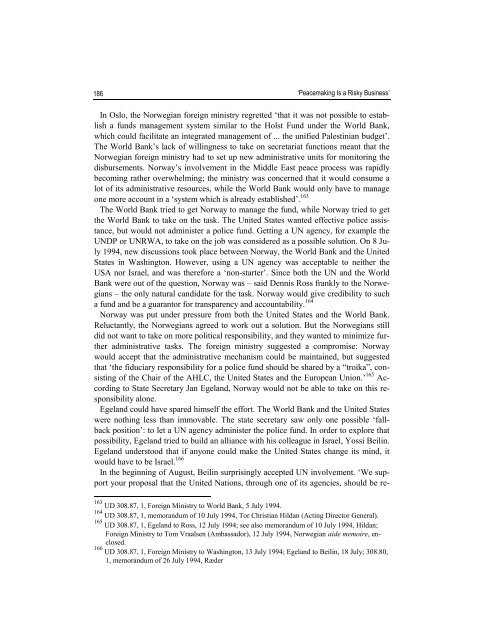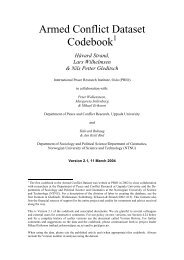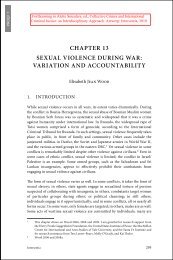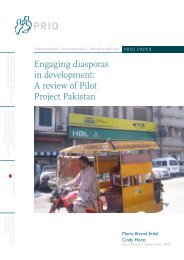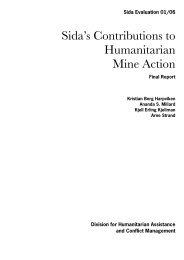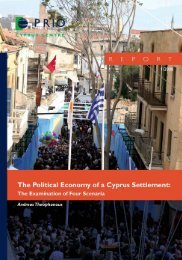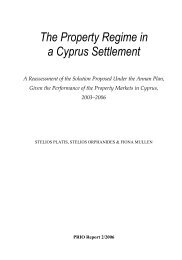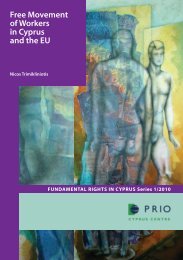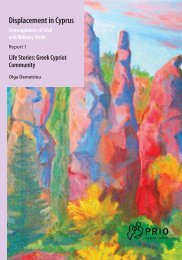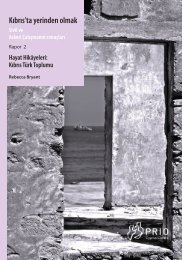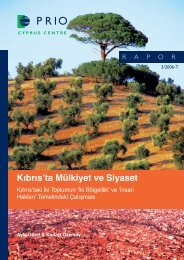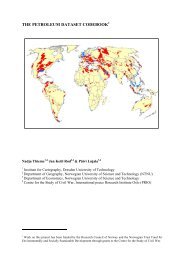Peacemaking Is a Risky Business - PRIO
Peacemaking Is a Risky Business - PRIO
Peacemaking Is a Risky Business - PRIO
Create successful ePaper yourself
Turn your PDF publications into a flip-book with our unique Google optimized e-Paper software.
186 ‘<strong>Peacemaking</strong> <strong>Is</strong> a <strong>Risky</strong> <strong>Business</strong>’In Oslo, the Norwegian foreign ministry regretted ‘that it was not possible to establisha funds management system similar to the Holst Fund under the World Bank,which could facilitate an integrated management of ... the unified Palestinian budget’.The World Bank’s lack of willingness to take on secretariat functions meant that theNorwegian foreign ministry had to set up new administrative units for monitoring thedisbursements. Norway’s involvement in the Middle East peace process was rapidlybecoming rather overwhelming; the ministry was concerned that it would consume alot of its administrative resources, while the World Bank would only have to manageone more account in a ‘system which is already established’. 163The World Bank tried to get Norway to manage the fund, while Norway tried to getthe World Bank to take on the task. The United States wanted effective police assistance,but would not administer a police fund. Getting a UN agency, for example theUNDP or UNRWA, to take on the job was considered as a possible solution. On 8 July1994, new discussions took place between Norway, the World Bank and the UnitedStates in Washington. However, using a UN agency was acceptable to neither theUSA nor <strong>Is</strong>rael, and was therefore a ‘non-starter’. Since both the UN and the WorldBank were out of the question, Norway was – said Dennis Ross frankly to the Norwegians– the only natural candidate for the task. Norway would give credibility to sucha fund and be a guarantor for transparency and accountability. 164Norway was put under pressure from both the United States and the World Bank.Reluctantly, the Norwegians agreed to work out a solution. But the Norwegians stilldid not want to take on more political responsibility, and they wanted to minimize furtheradministrative tasks. The foreign ministry suggested a compromise: Norwaywould accept that the administrative mechanism could be maintained, but suggestedthat ‘the fiduciary responsibility for a police fund should be shared by a “troika”, consistingof the Chair of the AHLC, the United States and the European Union.’ 165 Accordingto State Secretary Jan Egeland, Norway would not be able to take on this responsibilityalone.Egeland could have spared himself the effort. The World Bank and the United Stateswere nothing less than immovable. The state secretary saw only one possible ‘fallbackposition’: to let a UN agency administer the police fund. In order to explore thatpossibility, Egeland tried to build an alliance with his colleague in <strong>Is</strong>rael, Yossi Beilin.Egeland understood that if anyone could make the United States change its mind, itwould have to be <strong>Is</strong>rael. 166In the beginning of August, Beilin surprisingly accepted UN involvement. ‘We supportyour proposal that the United Nations, through one of its agencies, should be re-163 UD 308.87, 1, Foreign Ministry to World Bank, 5 July 1994.164 UD 308.87, 1, memorandum of 10 July 1994, Tor Christian Hildan (Acting Director General).165 UD 308.87, 1, Egeland to Ross, 12 July 1994; see also memorandum of 10 July 1994, Hildan;Foreign Ministry to Tom Vraalsen (Ambassador), 12 July 1994, Norwegian aide memoire, enclosed.166 UD 308.87, 1, Foreign Ministry to Washington, 13 July 1994; Egeland to Beilin, 18 July; 308.80,1, memorandum of 26 July 1994, Ræder


